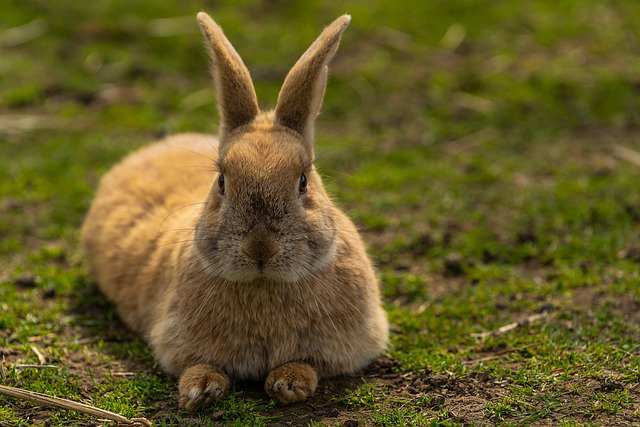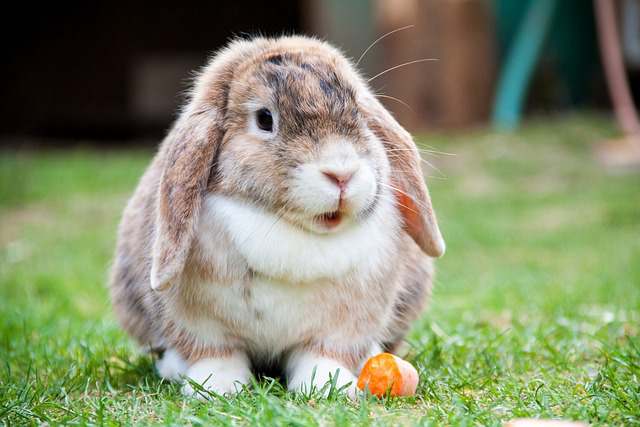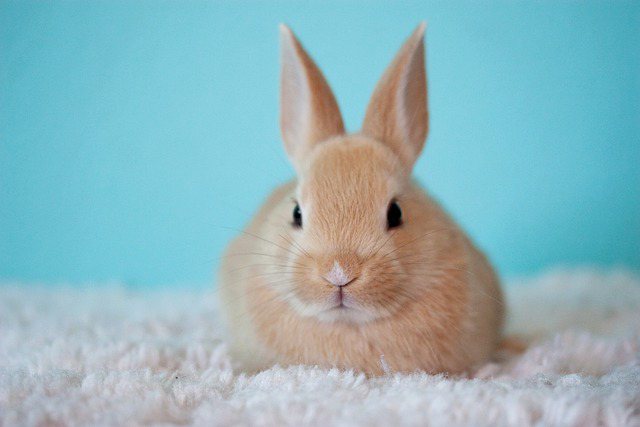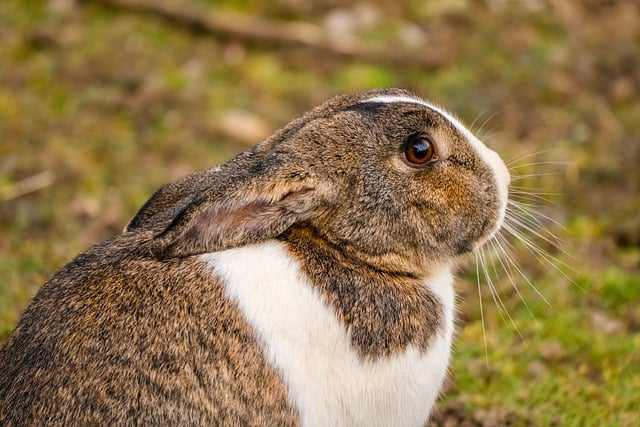11 Simple Signs of a Pregnant Rabbit & Care

Hey there, fellow rabbit enthusiasts! If you’ve been noticing some changes in your furry friend lately, you might be wondering: Could she be expecting little bunnies?
Well, fret not, because today we’re diving into the telltale signs of a pregnant rabbit, so you can be prepared for the pitter-patter of tiny paws in your home!
Signs of a Pregnant Rabbit
The following are some common signs of a pregnant rabbit:
1. Weight Gain
When it comes to identifying potential signs of a pregnant rabbit, weight gain can indeed be an important indicator. Just like in humans, pregnancy can cause rabbits to gain weight due to hormonal changes and increased appetite.
If you notice your rabbit putting on some extra pounds despite no changes in their diet or activity level, it could be a sign that they’re expecting. However, it’s crucial to consider other signs as well, such as nesting behavior and changes in behavior, to confirm pregnancy.
2. Altered Behavior
The behavioral changes in a pregnant rabbit stem from hormonal shifts triggered by the onset of pregnancy. Some rabbits become noticeably more affectionate and seek out interaction with their human companions.
This behavior reflects their natural inclination to bond and establish a secure environment for their forthcoming offspring. On the other hand, certain rabbits might display territorial behavior, exhibiting protective instincts that are inherent to impending motherhood.
3. Enlarged Abdomen

The visible enlargement of the abdomen during rabbit pregnancy is a direct consequence of embryonic growth and the expansion of the uterus. As the fetus develops, the mother’s body accommodates the growing life within her.
It’s important to carefully assess this change to distinguish between a pregnant rabbit and one with health issues. This distinction can be made through gentle palpation to feel the presence of individual fetuses.
4. Nesting Behavior
Nesting behavior in rabbits is a potential sign of pregnancy. When a female rabbit is pregnant, she may start exhibiting nesting instinct by gathering materials like hay, straw, and fur to create a cozy nest. This behavior is often observed a few days before the rabbit is due to give birth.
The rabbit will meticulously arrange the materials to form a comfortable and secure space for her kits. Nesting behavior is a reliable indicator of a pregnant rabbit and can serve as a clue for rabbit owners to prepare for the impending birth.
5. Fur Plucking
The act of plucking fur from her belly is a remarkable maternal behavior exhibited by pregnant rabbits. This fur is meticulously arranged within the nesting area to create a soft and warm bed for the kits.
The fur plucking not only serves as insulation but also facilitates a nurturing environment that aids the survival and comfort of the newborns.
6. Changes in Appetite
Pregnancy hormones influence a rabbit’s eating habits, leading to fluctuations in appetite. Some pregnant rabbits might exhibit an increase in food consumption due to the energy demands of pregnancy.
Conversely, others might experience a temporary decrease in appetite, potentially due to hormonal shifts. It’s crucial to continue providing a balanced diet to support both the mother’s health and the growth of her kits.
7. Nipple Development
The development of nipples in pregnant rabbits is an intriguing physiological adaptation in preparation for nursing. The increase in blood flow to the mammary glands causes the nipples to become more prominent and slightly darker in color.
This transformation is an incredible illustration of how their bodies are meticulously preparing for the demands of motherhood.
8. Increased Resting
Pregnancy places a physiological toll on a rabbit’s body. As her body prepares to nurture a new generation, the mother rabbit instinctively conserves energy through increased resting periods.
This rest is crucial to sustain her well-being and to preserve resources needed for the upcoming labor and nursing demands.
9. Vocalizations
The increase in vocalizations as the due date approaches is an intriguing facet of a pregnant rabbit’s behavior. These soft cooing, grunting, or humming sounds are believed to be a form of communication between the mother and her unborn kits.
This communication establishes a connection and may play a role in creating a sense of familiarity for the kits when they are born.
10. Decreased Activity
Toward the final stages of pregnancy, a rabbit’s reduced activity is a physiological response to the physical demands of carrying embryos.
As she conserves energy for the impending birth, you might notice her engaging in fewer high-energy behaviors. This slowdown is entirely normal and indicates her body’s focus on nurturing her kits.
11. Nest Box Usage
If a nest box is provided, a pregnant rabbit’s use of it serves as a strong indicator that birth is imminent. This deliberate choice of a designated birthing space underscores her instinctual need for a secure, enclosed area to bring her kits into the world.
Observing her preference for the nest box is a testament to her remarkable ability to assess and choose the best environment for her offspring.
Confirming Rabbit Pregnancy

The following are some common ways to confirm rabbit pregnancy:
A. Taking the rabbit to the vet for confirmation
Taking a rabbit to the vet for confirmation of pregnancy is a common and reliable method. Veterinarians have the necessary expertise and tools to accurately assess the reproductive status of rabbits.
During a visit to the vet, they will conduct a thorough examination of the rabbit, looking for physical signs of pregnancy such as weight gain, changes in the abdomen, and mammary gland development.
The vet may also perform additional tests or procedures to confirm the pregnancy, such as ultrasound or X-ray imaging.
B. Ultrasound or X-ray to confirm pregnancy
Ultrasound and X-ray imaging are two diagnostic techniques that veterinarians may use to confirm pregnancy in rabbits.
1. Ultrasound: Ultrasound is a non-invasive imaging technique that uses sound waves to create images of the internal structures of the body. It is commonly used to confirm pregnancy in rabbits. During an ultrasound examination, the vet will use a handheld device called a transducer to pass sound waves through the rabbit’s abdomen.
The sound waves then bounce back, creating an image of the uterus and any developing fetuses. This allows the vet to visualize the presence of embryos and determine the stage of pregnancy.
2. X-ray: X-ray imaging is another method that can be used to confirm pregnancy in rabbits. X-rays use ionizing radiation to create images of the body’s internal structures. During an X-ray examination, the rabbit is positioned on a table, and a machine emits a controlled amount of radiation through the body.
The X-rays that pass through the body are captured on a detector, creating an image. X-rays are particularly useful for visualizing the skeletal structures of developing fetuses. This can help determine the number of fetuses and their stage of development.
How to Best Care for a Pregnant Rabbit

Taking care of a pregnant rabbit is crucial to ensure the health and well-being of both the mother and the litter.
Here are some best ways to care for a pregnant rabbit until she gives birth:
1. Provide a comfortable nesting area: Create a quiet and cozy nesting area for the pregnant rabbit. A nest box is recommended to mimic a burrow-like environment, providing a safe and secure space for the mother to give birth.
2. Offer a balanced diet: Pregnant rabbits require a well-balanced diet to support their growing litter. Provide a combination of fresh hay, high-quality pellets, and a variety of fresh vegetables to ensure proper nutrition.
3. Monitor weight gain: Regularly monitor the pregnant rabbit’s weight to ensure she is gaining weight steadily. Sudden weight loss or lack of weight gain may indicate a problem and require veterinary attention.
4. Provide unlimited hay and water: Fresh hay should be available at all times for the rabbit to nibble on. Additionally, ensure a constant supply of clean and fresh water to keep the mother hydrated.
5. Limit stress and disturbances: Minimize stress and disturbances around the pregnant rabbit. Avoid loud noises, sudden movements, or handling her too frequently. A calm and quiet environment is essential for her well-being.
6. Regular veterinary check-ups: Schedule regular veterinary check-ups throughout the pregnancy. A veterinarian can monitor the rabbit’s health, ensure the pregnancy is progressing well, and provide any necessary medical interventions.
7. Monitor nesting behavior: Observe the rabbit’s nesting behavior. If she starts pulling fur from her body and arranging it in the nesting box, it indicates that she is preparing for birth. Ensure the nest box is well-stocked with clean, soft nesting materials.
8. Maintain proper hygiene: Keep the pregnant rabbit’s living area clean and hygienic. Regularly clean the nest box, remove any soiled bedding, and maintain good sanitation practices to prevent the spread of diseases.
9. Be prepared for birthing complications: Educate yourself about potential birthing complications and have a plan in place. In case of any difficulties during labor, be prepared to seek immediate veterinary assistance to ensure the safety of the mother and the litter.
Remember, each rabbit is unique, and it is always advisable to consult with a veterinarian experienced in rabbit care for personalized guidance throughout the pregnancy and birthing process.
Related Questions
How can I tell if my rabbit is pregnant?
Look for physical signs such as weight gain, a rounder belly, and enlarged nipples. Behavioral changes, like nesting behaviors and mood swings, can also indicate pregnancy.
How long is a rabbit’s gestation period?
The gestation period for a rabbit is typically around 31 to 33 days. However, it can vary slightly depending on the breed and individual rabbit.
Can I feel the babies moving inside the rabbit?
Feeling the babies moving inside the rabbit is not as easy as in some other animals. It can be challenging to detect fetal movement due to the rabbit’s thick abdominal muscles and the size of the babies. However, a skilled veterinarian might be able to feel them during a physical examination.
Is there a way to confirm pregnancy without a vet visit?
While a veterinarian can provide the most accurate confirmation of pregnancy, you can observe your rabbit for other signs. A pregnant rabbit may show nesting behaviors, become more territorial, and exhibit changes in appetite and behavior.
How many babies can a pregnant rabbit have?
Rabbits are known for their high reproductive capacity. A pregnant rabbit can have a litter size ranging from 1 to 14 kits, with the average size being 6 to 8 kits.
Are there any health concerns during rabbit pregnancy?
Yes, there are some potential health concerns to be aware of during rabbit pregnancy. These include the risk of malpositioned kits, complications during birth, and increased vulnerability to certain infections. Regular veterinary check-ups are essential to ensure the health and well-being of both the mother and her babies.
Conclusion
In conclusion, if you suspect that your rabbit may be pregnant, there are a few key signs to look out for.
Keep an eye out for changes in behavior, such as nesting and aggression, as well as physical changes like weight gain and enlarged nipples.
Remember, if you’re unsure, it’s always best to consult with a veterinarian to ensure the health and well-being of your furry friend. Happy bunny parenting!
